Business and the Business Environment Analysis Report for BARCLAYS
VerifiedAdded on 2020/07/22
|19
|5472
|65
Report
AI Summary
This report provides a comprehensive analysis of the business environment, focusing on the operations of BARCLAYS. It begins with an introduction to the business environment, encompassing both macro and micro components that influence organizational functioning. The report delves into different types of organizations, including private, public, and voluntary sectors, detailing their structures, purposes, and scopes. It examines the relationships between organizational functions and structures, as well as the positive and negative impacts of the macro-environment (political, economic, social, technological, environmental, and legal factors) on business operations. A SWOT analysis of BARCLAYS is conducted to assess its strengths, weaknesses, opportunities, and threats, followed by an examination of the interrelation between its internal factors and external macro-environmental influences. The report concludes with a summary of the key findings and a list of references.
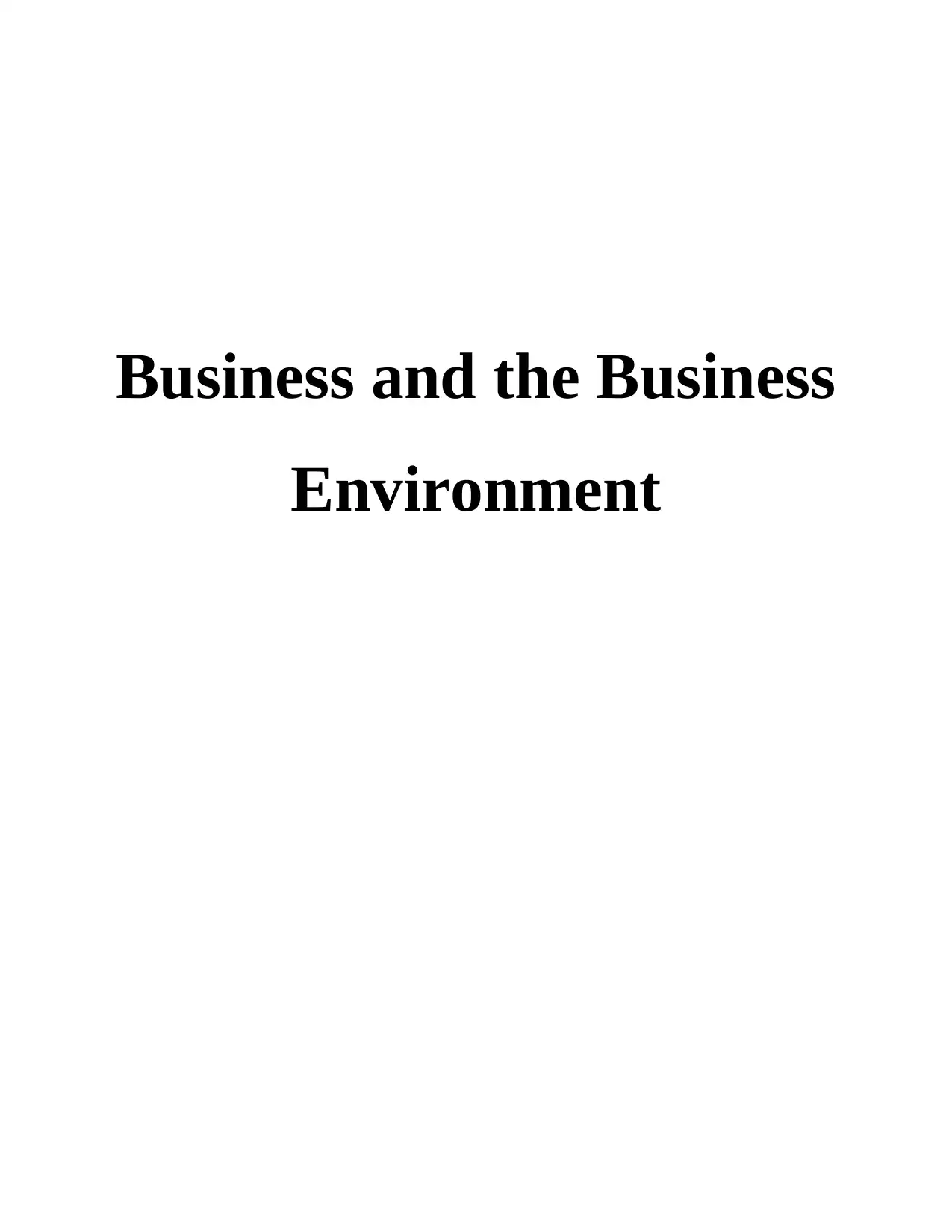
Business and the Business
Environment
Environment
Paraphrase This Document
Need a fresh take? Get an instant paraphrase of this document with our AI Paraphraser
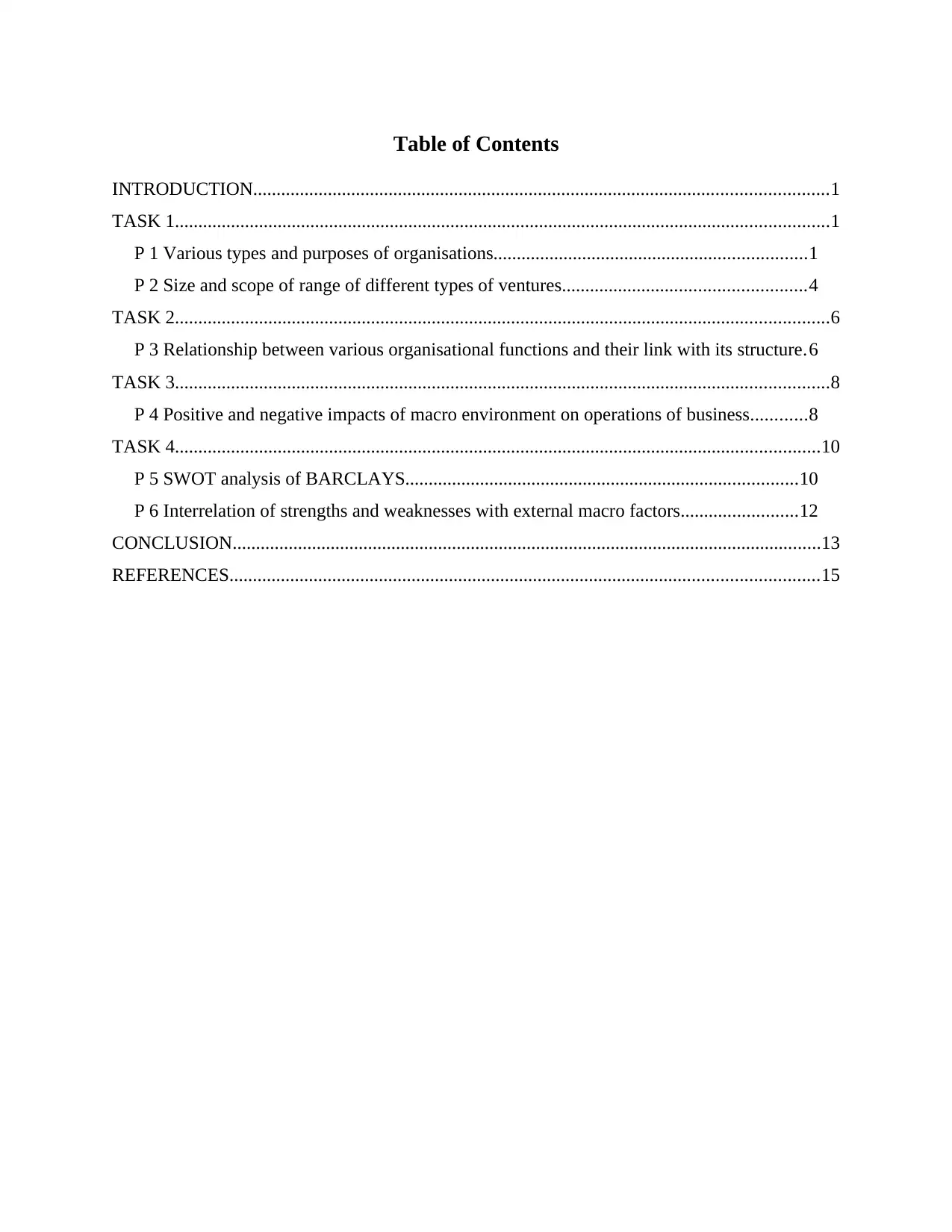
Table of Contents
INTRODUCTION...........................................................................................................................1
TASK 1............................................................................................................................................1
P 1 Various types and purposes of organisations...................................................................1
P 2 Size and scope of range of different types of ventures....................................................4
TASK 2............................................................................................................................................6
P 3 Relationship between various organisational functions and their link with its structure.6
TASK 3............................................................................................................................................8
P 4 Positive and negative impacts of macro environment on operations of business............8
TASK 4..........................................................................................................................................10
P 5 SWOT analysis of BARCLAYS....................................................................................10
P 6 Interrelation of strengths and weaknesses with external macro factors.........................12
CONCLUSION..............................................................................................................................13
REFERENCES..............................................................................................................................15
INTRODUCTION...........................................................................................................................1
TASK 1............................................................................................................................................1
P 1 Various types and purposes of organisations...................................................................1
P 2 Size and scope of range of different types of ventures....................................................4
TASK 2............................................................................................................................................6
P 3 Relationship between various organisational functions and their link with its structure.6
TASK 3............................................................................................................................................8
P 4 Positive and negative impacts of macro environment on operations of business............8
TASK 4..........................................................................................................................................10
P 5 SWOT analysis of BARCLAYS....................................................................................10
P 6 Interrelation of strengths and weaknesses with external macro factors.........................12
CONCLUSION..............................................................................................................................13
REFERENCES..............................................................................................................................15

⊘ This is a preview!⊘
Do you want full access?
Subscribe today to unlock all pages.

Trusted by 1+ million students worldwide
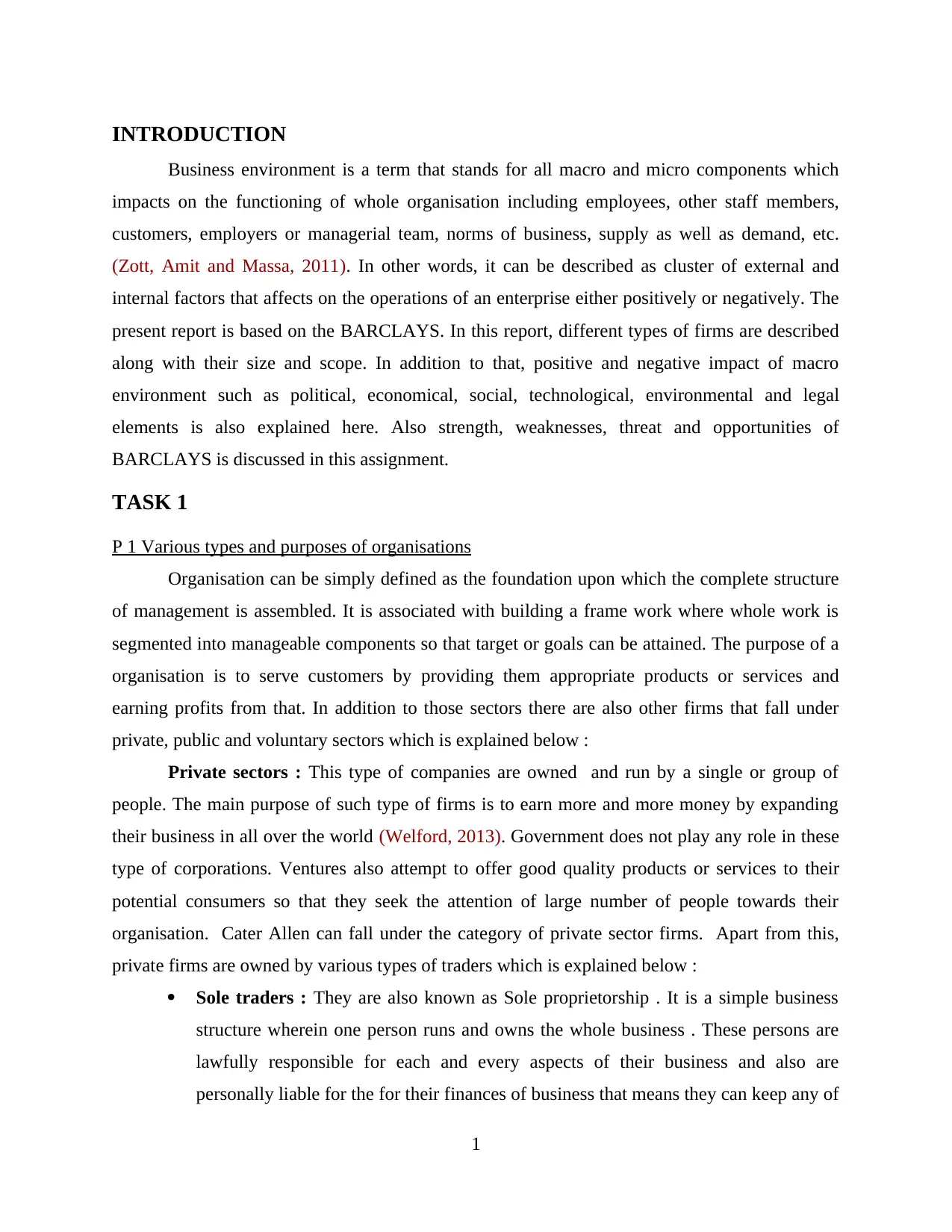
INTRODUCTION
Business environment is a term that stands for all macro and micro components which
impacts on the functioning of whole organisation including employees, other staff members,
customers, employers or managerial team, norms of business, supply as well as demand, etc.
(Zott, Amit and Massa, 2011). In other words, it can be described as cluster of external and
internal factors that affects on the operations of an enterprise either positively or negatively. The
present report is based on the BARCLAYS. In this report, different types of firms are described
along with their size and scope. In addition to that, positive and negative impact of macro
environment such as political, economical, social, technological, environmental and legal
elements is also explained here. Also strength, weaknesses, threat and opportunities of
BARCLAYS is discussed in this assignment.
TASK 1
P 1 Various types and purposes of organisations
Organisation can be simply defined as the foundation upon which the complete structure
of management is assembled. It is associated with building a frame work where whole work is
segmented into manageable components so that target or goals can be attained. The purpose of a
organisation is to serve customers by providing them appropriate products or services and
earning profits from that. In addition to those sectors there are also other firms that fall under
private, public and voluntary sectors which is explained below :
Private sectors : This type of companies are owned and run by a single or group of
people. The main purpose of such type of firms is to earn more and more money by expanding
their business in all over the world (Welford, 2013). Government does not play any role in these
type of corporations. Ventures also attempt to offer good quality products or services to their
potential consumers so that they seek the attention of large number of people towards their
organisation. Cater Allen can fall under the category of private sector firms. Apart from this,
private firms are owned by various types of traders which is explained below :
Sole traders : They are also known as Sole proprietorship . It is a simple business
structure wherein one person runs and owns the whole business . These persons are
lawfully responsible for each and every aspects of their business and also are
personally liable for the for their finances of business that means they can keep any of
1
Business environment is a term that stands for all macro and micro components which
impacts on the functioning of whole organisation including employees, other staff members,
customers, employers or managerial team, norms of business, supply as well as demand, etc.
(Zott, Amit and Massa, 2011). In other words, it can be described as cluster of external and
internal factors that affects on the operations of an enterprise either positively or negatively. The
present report is based on the BARCLAYS. In this report, different types of firms are described
along with their size and scope. In addition to that, positive and negative impact of macro
environment such as political, economical, social, technological, environmental and legal
elements is also explained here. Also strength, weaknesses, threat and opportunities of
BARCLAYS is discussed in this assignment.
TASK 1
P 1 Various types and purposes of organisations
Organisation can be simply defined as the foundation upon which the complete structure
of management is assembled. It is associated with building a frame work where whole work is
segmented into manageable components so that target or goals can be attained. The purpose of a
organisation is to serve customers by providing them appropriate products or services and
earning profits from that. In addition to those sectors there are also other firms that fall under
private, public and voluntary sectors which is explained below :
Private sectors : This type of companies are owned and run by a single or group of
people. The main purpose of such type of firms is to earn more and more money by expanding
their business in all over the world (Welford, 2013). Government does not play any role in these
type of corporations. Ventures also attempt to offer good quality products or services to their
potential consumers so that they seek the attention of large number of people towards their
organisation. Cater Allen can fall under the category of private sector firms. Apart from this,
private firms are owned by various types of traders which is explained below :
Sole traders : They are also known as Sole proprietorship . It is a simple business
structure wherein one person runs and owns the whole business . These persons are
lawfully responsible for each and every aspects of their business and also are
personally liable for the for their finances of business that means they can keep any of
1
Paraphrase This Document
Need a fresh take? Get an instant paraphrase of this document with our AI Paraphraser
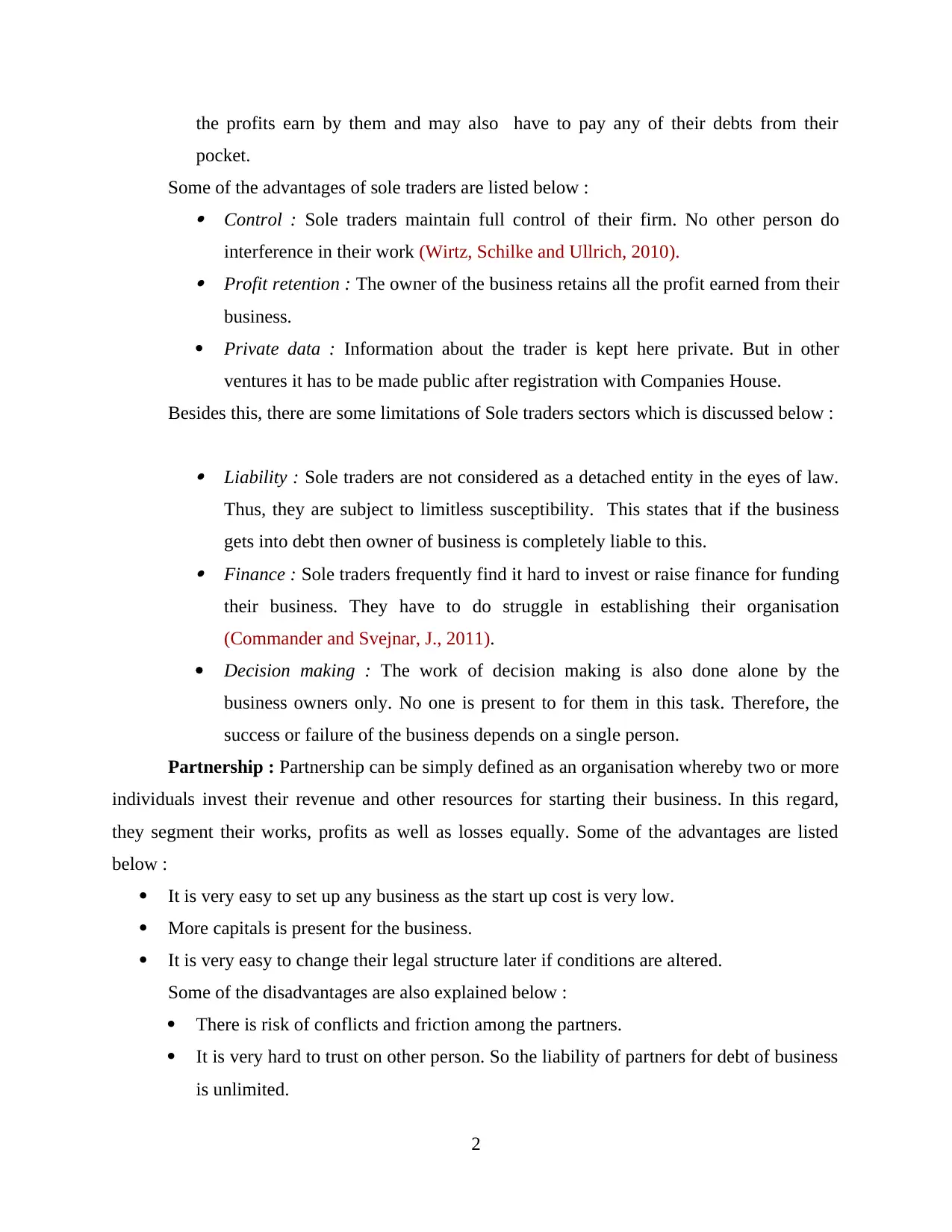
the profits earn by them and may also have to pay any of their debts from their
pocket.
Some of the advantages of sole traders are listed below :
Control : Sole traders maintain full control of their firm. No other person do
interference in their work (Wirtz, Schilke and Ullrich, 2010).
Profit retention : The owner of the business retains all the profit earned from their
business.
Private data : Information about the trader is kept here private. But in other
ventures it has to be made public after registration with Companies House.
Besides this, there are some limitations of Sole traders sectors which is discussed below :
Liability : Sole traders are not considered as a detached entity in the eyes of law.
Thus, they are subject to limitless susceptibility. This states that if the business
gets into debt then owner of business is completely liable to this.
Finance : Sole traders frequently find it hard to invest or raise finance for funding
their business. They have to do struggle in establishing their organisation
(Commander and Svejnar, J., 2011).
Decision making : The work of decision making is also done alone by the
business owners only. No one is present to for them in this task. Therefore, the
success or failure of the business depends on a single person.
Partnership : Partnership can be simply defined as an organisation whereby two or more
individuals invest their revenue and other resources for starting their business. In this regard,
they segment their works, profits as well as losses equally. Some of the advantages are listed
below :
It is very easy to set up any business as the start up cost is very low.
More capitals is present for the business.
It is very easy to change their legal structure later if conditions are altered.
Some of the disadvantages are also explained below :
There is risk of conflicts and friction among the partners.
It is very hard to trust on other person. So the liability of partners for debt of business
is unlimited.
2
pocket.
Some of the advantages of sole traders are listed below :
Control : Sole traders maintain full control of their firm. No other person do
interference in their work (Wirtz, Schilke and Ullrich, 2010).
Profit retention : The owner of the business retains all the profit earned from their
business.
Private data : Information about the trader is kept here private. But in other
ventures it has to be made public after registration with Companies House.
Besides this, there are some limitations of Sole traders sectors which is discussed below :
Liability : Sole traders are not considered as a detached entity in the eyes of law.
Thus, they are subject to limitless susceptibility. This states that if the business
gets into debt then owner of business is completely liable to this.
Finance : Sole traders frequently find it hard to invest or raise finance for funding
their business. They have to do struggle in establishing their organisation
(Commander and Svejnar, J., 2011).
Decision making : The work of decision making is also done alone by the
business owners only. No one is present to for them in this task. Therefore, the
success or failure of the business depends on a single person.
Partnership : Partnership can be simply defined as an organisation whereby two or more
individuals invest their revenue and other resources for starting their business. In this regard,
they segment their works, profits as well as losses equally. Some of the advantages are listed
below :
It is very easy to set up any business as the start up cost is very low.
More capitals is present for the business.
It is very easy to change their legal structure later if conditions are altered.
Some of the disadvantages are also explained below :
There is risk of conflicts and friction among the partners.
It is very hard to trust on other person. So the liability of partners for debt of business
is unlimited.
2
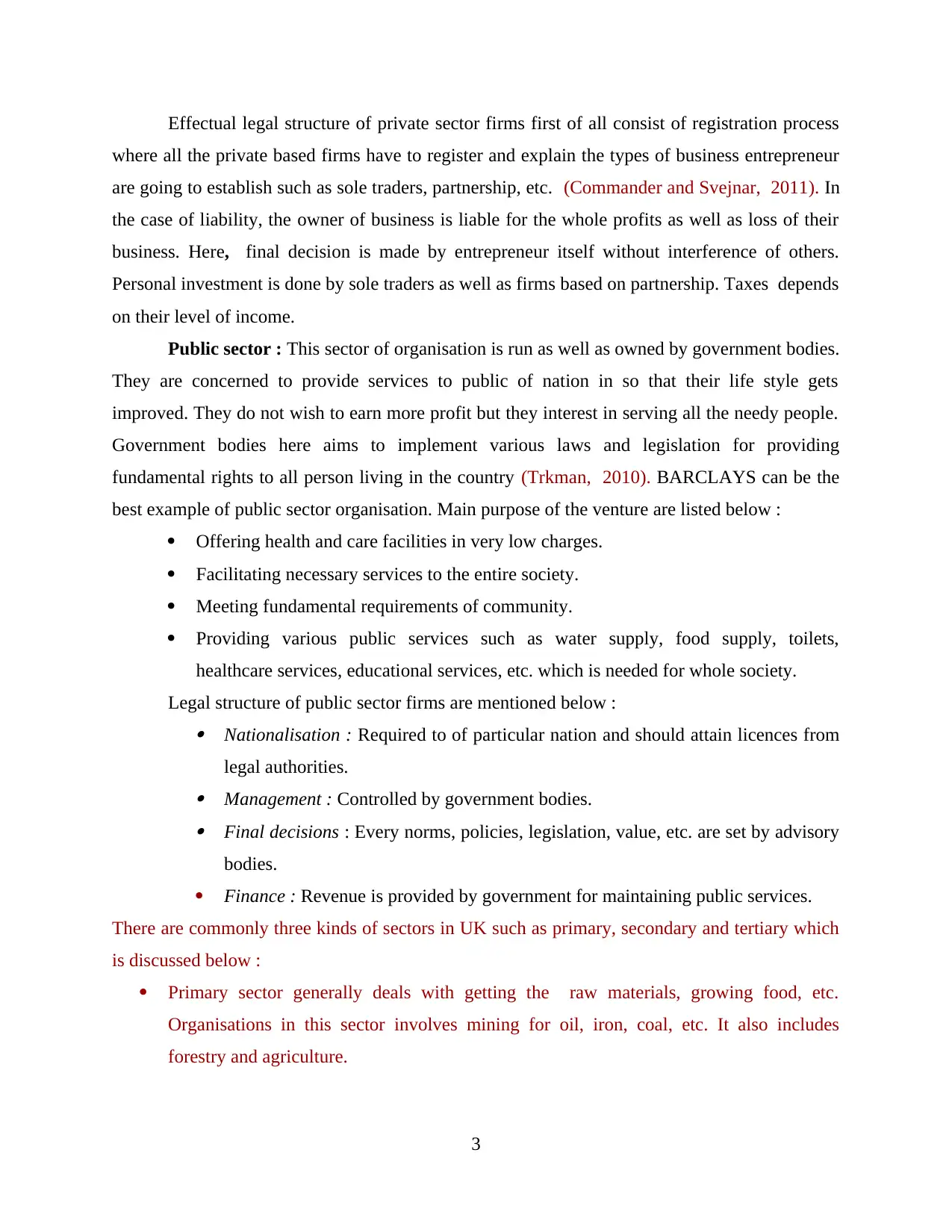
Effectual legal structure of private sector firms first of all consist of registration process
where all the private based firms have to register and explain the types of business entrepreneur
are going to establish such as sole traders, partnership, etc. (Commander and Svejnar, 2011). In
the case of liability, the owner of business is liable for the whole profits as well as loss of their
business. Here, final decision is made by entrepreneur itself without interference of others.
Personal investment is done by sole traders as well as firms based on partnership. Taxes depends
on their level of income.
Public sector : This sector of organisation is run as well as owned by government bodies.
They are concerned to provide services to public of nation in so that their life style gets
improved. They do not wish to earn more profit but they interest in serving all the needy people.
Government bodies here aims to implement various laws and legislation for providing
fundamental rights to all person living in the country (Trkman, 2010). BARCLAYS can be the
best example of public sector organisation. Main purpose of the venture are listed below :
Offering health and care facilities in very low charges.
Facilitating necessary services to the entire society.
Meeting fundamental requirements of community.
Providing various public services such as water supply, food supply, toilets,
healthcare services, educational services, etc. which is needed for whole society.
Legal structure of public sector firms are mentioned below :
Nationalisation : Required to of particular nation and should attain licences from
legal authorities.
Management : Controlled by government bodies.
Final decisions : Every norms, policies, legislation, value, etc. are set by advisory
bodies.
Finance : Revenue is provided by government for maintaining public services.
There are commonly three kinds of sectors in UK such as primary, secondary and tertiary which
is discussed below :
Primary sector generally deals with getting the raw materials, growing food, etc.
Organisations in this sector involves mining for oil, iron, coal, etc. It also includes
forestry and agriculture.
3
where all the private based firms have to register and explain the types of business entrepreneur
are going to establish such as sole traders, partnership, etc. (Commander and Svejnar, 2011). In
the case of liability, the owner of business is liable for the whole profits as well as loss of their
business. Here, final decision is made by entrepreneur itself without interference of others.
Personal investment is done by sole traders as well as firms based on partnership. Taxes depends
on their level of income.
Public sector : This sector of organisation is run as well as owned by government bodies.
They are concerned to provide services to public of nation in so that their life style gets
improved. They do not wish to earn more profit but they interest in serving all the needy people.
Government bodies here aims to implement various laws and legislation for providing
fundamental rights to all person living in the country (Trkman, 2010). BARCLAYS can be the
best example of public sector organisation. Main purpose of the venture are listed below :
Offering health and care facilities in very low charges.
Facilitating necessary services to the entire society.
Meeting fundamental requirements of community.
Providing various public services such as water supply, food supply, toilets,
healthcare services, educational services, etc. which is needed for whole society.
Legal structure of public sector firms are mentioned below :
Nationalisation : Required to of particular nation and should attain licences from
legal authorities.
Management : Controlled by government bodies.
Final decisions : Every norms, policies, legislation, value, etc. are set by advisory
bodies.
Finance : Revenue is provided by government for maintaining public services.
There are commonly three kinds of sectors in UK such as primary, secondary and tertiary which
is discussed below :
Primary sector generally deals with getting the raw materials, growing food, etc.
Organisations in this sector involves mining for oil, iron, coal, etc. It also includes
forestry and agriculture.
3
⊘ This is a preview!⊘
Do you want full access?
Subscribe today to unlock all pages.

Trusted by 1+ million students worldwide
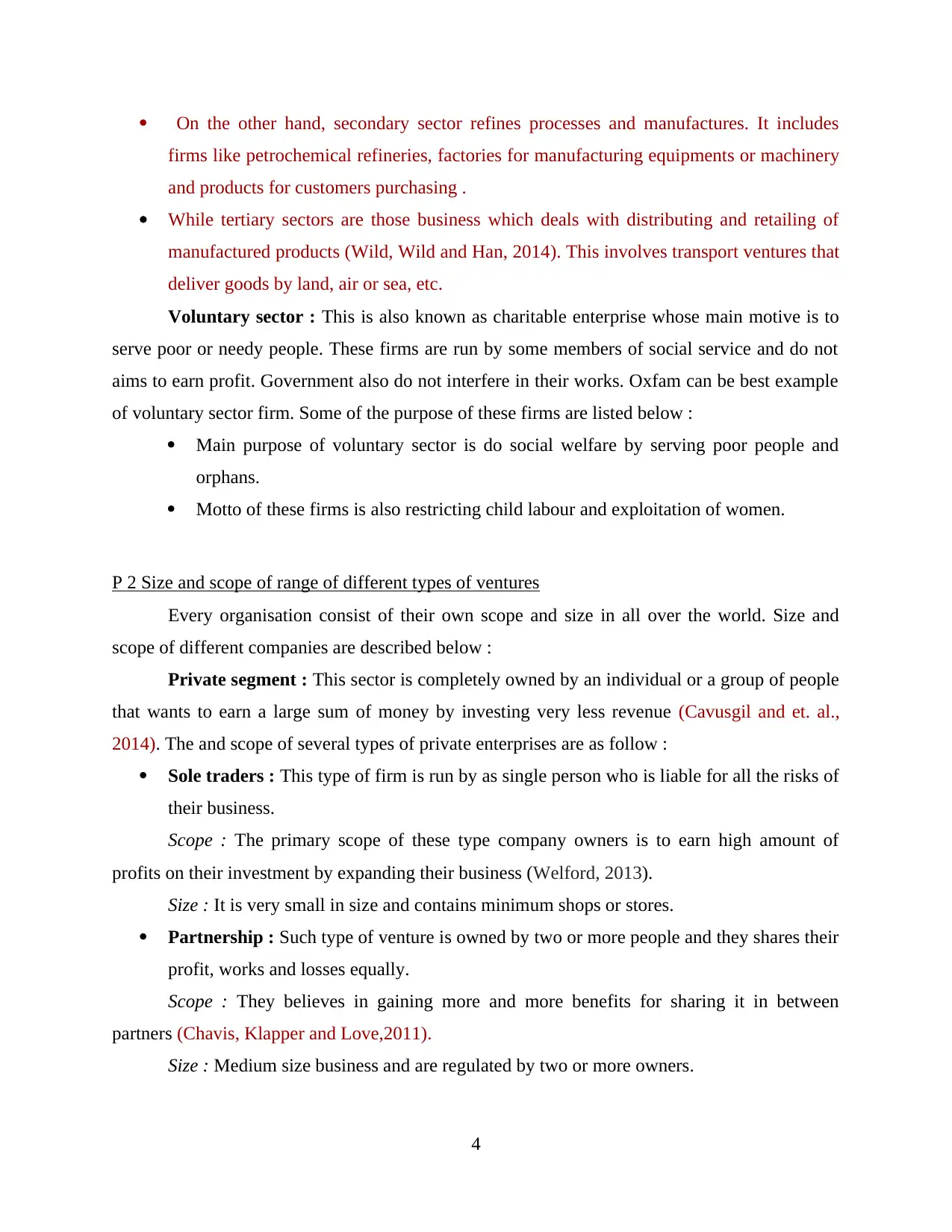
On the other hand, secondary sector refines processes and manufactures. It includes
firms like petrochemical refineries, factories for manufacturing equipments or machinery
and products for customers purchasing .
While tertiary sectors are those business which deals with distributing and retailing of
manufactured products (Wild, Wild and Han, 2014). This involves transport ventures that
deliver goods by land, air or sea, etc.
Voluntary sector : This is also known as charitable enterprise whose main motive is to
serve poor or needy people. These firms are run by some members of social service and do not
aims to earn profit. Government also do not interfere in their works. Oxfam can be best example
of voluntary sector firm. Some of the purpose of these firms are listed below :
Main purpose of voluntary sector is do social welfare by serving poor people and
orphans.
Motto of these firms is also restricting child labour and exploitation of women.
P 2 Size and scope of range of different types of ventures
Every organisation consist of their own scope and size in all over the world. Size and
scope of different companies are described below :
Private segment : This sector is completely owned by an individual or a group of people
that wants to earn a large sum of money by investing very less revenue (Cavusgil and et. al.,
2014). The and scope of several types of private enterprises are as follow :
Sole traders : This type of firm is run by as single person who is liable for all the risks of
their business.
Scope : The primary scope of these type company owners is to earn high amount of
profits on their investment by expanding their business (Welford, 2013).
Size : It is very small in size and contains minimum shops or stores.
Partnership : Such type of venture is owned by two or more people and they shares their
profit, works and losses equally.
Scope : They believes in gaining more and more benefits for sharing it in between
partners (Chavis, Klapper and Love,2011).
Size : Medium size business and are regulated by two or more owners.
4
firms like petrochemical refineries, factories for manufacturing equipments or machinery
and products for customers purchasing .
While tertiary sectors are those business which deals with distributing and retailing of
manufactured products (Wild, Wild and Han, 2014). This involves transport ventures that
deliver goods by land, air or sea, etc.
Voluntary sector : This is also known as charitable enterprise whose main motive is to
serve poor or needy people. These firms are run by some members of social service and do not
aims to earn profit. Government also do not interfere in their works. Oxfam can be best example
of voluntary sector firm. Some of the purpose of these firms are listed below :
Main purpose of voluntary sector is do social welfare by serving poor people and
orphans.
Motto of these firms is also restricting child labour and exploitation of women.
P 2 Size and scope of range of different types of ventures
Every organisation consist of their own scope and size in all over the world. Size and
scope of different companies are described below :
Private segment : This sector is completely owned by an individual or a group of people
that wants to earn a large sum of money by investing very less revenue (Cavusgil and et. al.,
2014). The and scope of several types of private enterprises are as follow :
Sole traders : This type of firm is run by as single person who is liable for all the risks of
their business.
Scope : The primary scope of these type company owners is to earn high amount of
profits on their investment by expanding their business (Welford, 2013).
Size : It is very small in size and contains minimum shops or stores.
Partnership : Such type of venture is owned by two or more people and they shares their
profit, works and losses equally.
Scope : They believes in gaining more and more benefits for sharing it in between
partners (Chavis, Klapper and Love,2011).
Size : Medium size business and are regulated by two or more owners.
4
Paraphrase This Document
Need a fresh take? Get an instant paraphrase of this document with our AI Paraphraser
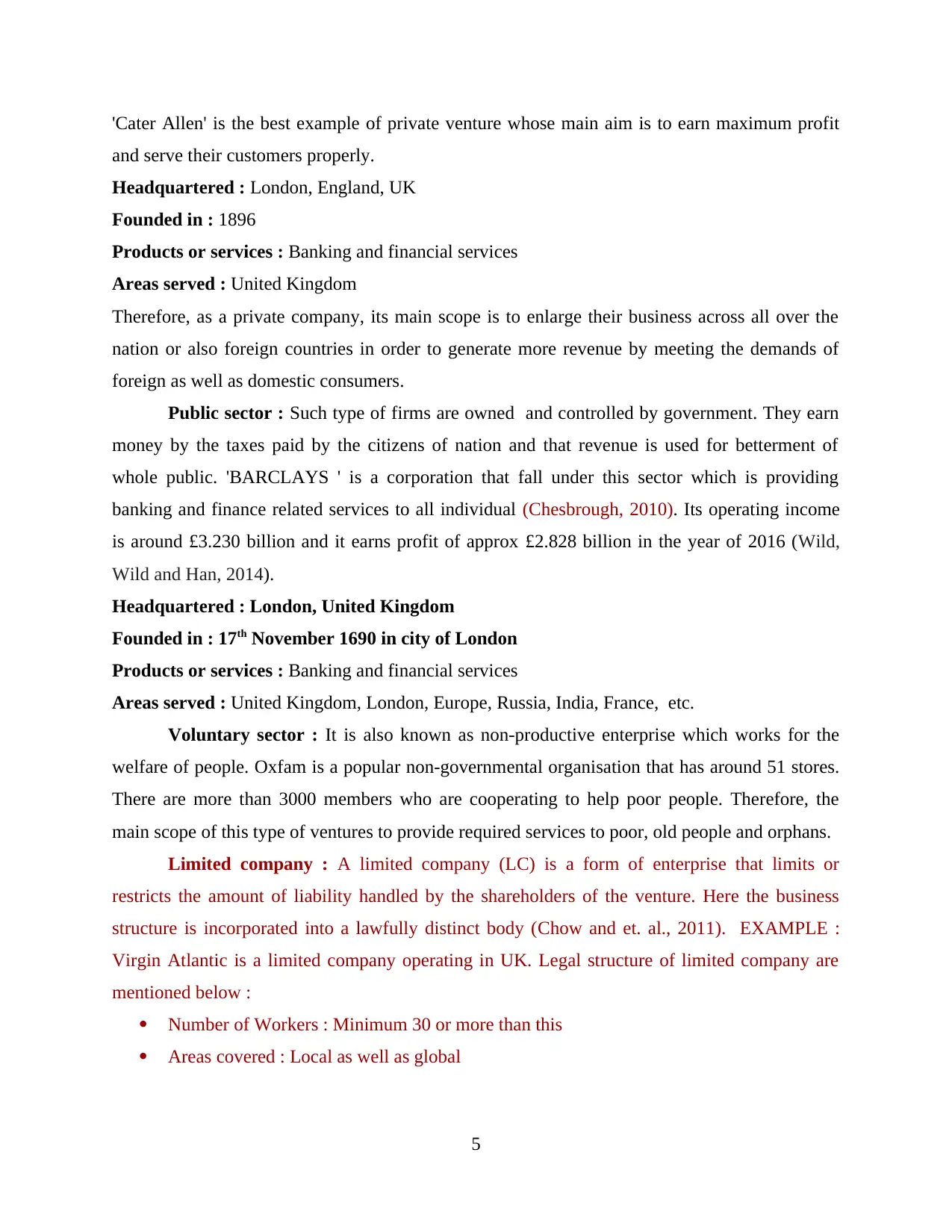
'Cater Allen' is the best example of private venture whose main aim is to earn maximum profit
and serve their customers properly.
Headquartered : London, England, UK
Founded in : 1896
Products or services : Banking and financial services
Areas served : United Kingdom
Therefore, as a private company, its main scope is to enlarge their business across all over the
nation or also foreign countries in order to generate more revenue by meeting the demands of
foreign as well as domestic consumers.
Public sector : Such type of firms are owned and controlled by government. They earn
money by the taxes paid by the citizens of nation and that revenue is used for betterment of
whole public. 'BARCLAYS ' is a corporation that fall under this sector which is providing
banking and finance related services to all individual (Chesbrough, 2010). Its operating income
is around £3.230 billion and it earns profit of approx £2.828 billion in the year of 2016 (Wild,
Wild and Han, 2014).
Headquartered : London, United Kingdom
Founded in : 17th November 1690 in city of London
Products or services : Banking and financial services
Areas served : United Kingdom, London, Europe, Russia, India, France, etc.
Voluntary sector : It is also known as non-productive enterprise which works for the
welfare of people. Oxfam is a popular non-governmental organisation that has around 51 stores.
There are more than 3000 members who are cooperating to help poor people. Therefore, the
main scope of this type of ventures to provide required services to poor, old people and orphans.
Limited company : A limited company (LC) is a form of enterprise that limits or
restricts the amount of liability handled by the shareholders of the venture. Here the business
structure is incorporated into a lawfully distinct body (Chow and et. al., 2011). EXAMPLE :
Virgin Atlantic is a limited company operating in UK. Legal structure of limited company are
mentioned below :
Number of Workers : Minimum 30 or more than this
Areas covered : Local as well as global
5
and serve their customers properly.
Headquartered : London, England, UK
Founded in : 1896
Products or services : Banking and financial services
Areas served : United Kingdom
Therefore, as a private company, its main scope is to enlarge their business across all over the
nation or also foreign countries in order to generate more revenue by meeting the demands of
foreign as well as domestic consumers.
Public sector : Such type of firms are owned and controlled by government. They earn
money by the taxes paid by the citizens of nation and that revenue is used for betterment of
whole public. 'BARCLAYS ' is a corporation that fall under this sector which is providing
banking and finance related services to all individual (Chesbrough, 2010). Its operating income
is around £3.230 billion and it earns profit of approx £2.828 billion in the year of 2016 (Wild,
Wild and Han, 2014).
Headquartered : London, United Kingdom
Founded in : 17th November 1690 in city of London
Products or services : Banking and financial services
Areas served : United Kingdom, London, Europe, Russia, India, France, etc.
Voluntary sector : It is also known as non-productive enterprise which works for the
welfare of people. Oxfam is a popular non-governmental organisation that has around 51 stores.
There are more than 3000 members who are cooperating to help poor people. Therefore, the
main scope of this type of ventures to provide required services to poor, old people and orphans.
Limited company : A limited company (LC) is a form of enterprise that limits or
restricts the amount of liability handled by the shareholders of the venture. Here the business
structure is incorporated into a lawfully distinct body (Chow and et. al., 2011). EXAMPLE :
Virgin Atlantic is a limited company operating in UK. Legal structure of limited company are
mentioned below :
Number of Workers : Minimum 30 or more than this
Areas covered : Local as well as global
5
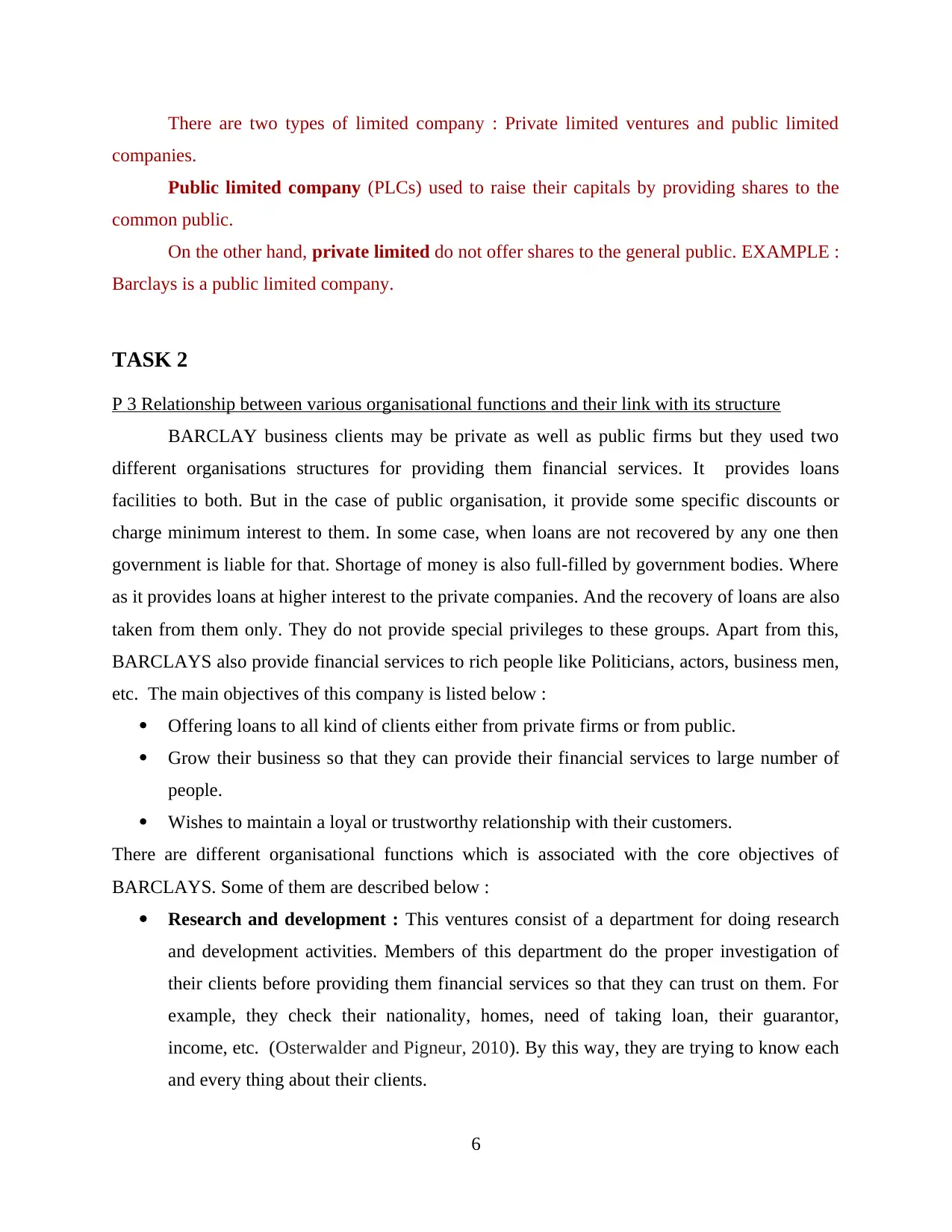
There are two types of limited company : Private limited ventures and public limited
companies.
Public limited company (PLCs) used to raise their capitals by providing shares to the
common public.
On the other hand, private limited do not offer shares to the general public. EXAMPLE :
Barclays is a public limited company.
TASK 2
P 3 Relationship between various organisational functions and their link with its structure
BARCLAY business clients may be private as well as public firms but they used two
different organisations structures for providing them financial services. It provides loans
facilities to both. But in the case of public organisation, it provide some specific discounts or
charge minimum interest to them. In some case, when loans are not recovered by any one then
government is liable for that. Shortage of money is also full-filled by government bodies. Where
as it provides loans at higher interest to the private companies. And the recovery of loans are also
taken from them only. They do not provide special privileges to these groups. Apart from this,
BARCLAYS also provide financial services to rich people like Politicians, actors, business men,
etc. The main objectives of this company is listed below :
Offering loans to all kind of clients either from private firms or from public.
Grow their business so that they can provide their financial services to large number of
people.
Wishes to maintain a loyal or trustworthy relationship with their customers.
There are different organisational functions which is associated with the core objectives of
BARCLAYS. Some of them are described below :
Research and development : This ventures consist of a department for doing research
and development activities. Members of this department do the proper investigation of
their clients before providing them financial services so that they can trust on them. For
example, they check their nationality, homes, need of taking loan, their guarantor,
income, etc. (Osterwalder and Pigneur, 2010). By this way, they are trying to know each
and every thing about their clients.
6
companies.
Public limited company (PLCs) used to raise their capitals by providing shares to the
common public.
On the other hand, private limited do not offer shares to the general public. EXAMPLE :
Barclays is a public limited company.
TASK 2
P 3 Relationship between various organisational functions and their link with its structure
BARCLAY business clients may be private as well as public firms but they used two
different organisations structures for providing them financial services. It provides loans
facilities to both. But in the case of public organisation, it provide some specific discounts or
charge minimum interest to them. In some case, when loans are not recovered by any one then
government is liable for that. Shortage of money is also full-filled by government bodies. Where
as it provides loans at higher interest to the private companies. And the recovery of loans are also
taken from them only. They do not provide special privileges to these groups. Apart from this,
BARCLAYS also provide financial services to rich people like Politicians, actors, business men,
etc. The main objectives of this company is listed below :
Offering loans to all kind of clients either from private firms or from public.
Grow their business so that they can provide their financial services to large number of
people.
Wishes to maintain a loyal or trustworthy relationship with their customers.
There are different organisational functions which is associated with the core objectives of
BARCLAYS. Some of them are described below :
Research and development : This ventures consist of a department for doing research
and development activities. Members of this department do the proper investigation of
their clients before providing them financial services so that they can trust on them. For
example, they check their nationality, homes, need of taking loan, their guarantor,
income, etc. (Osterwalder and Pigneur, 2010). By this way, they are trying to know each
and every thing about their clients.
6
⊘ This is a preview!⊘
Do you want full access?
Subscribe today to unlock all pages.

Trusted by 1+ million students worldwide
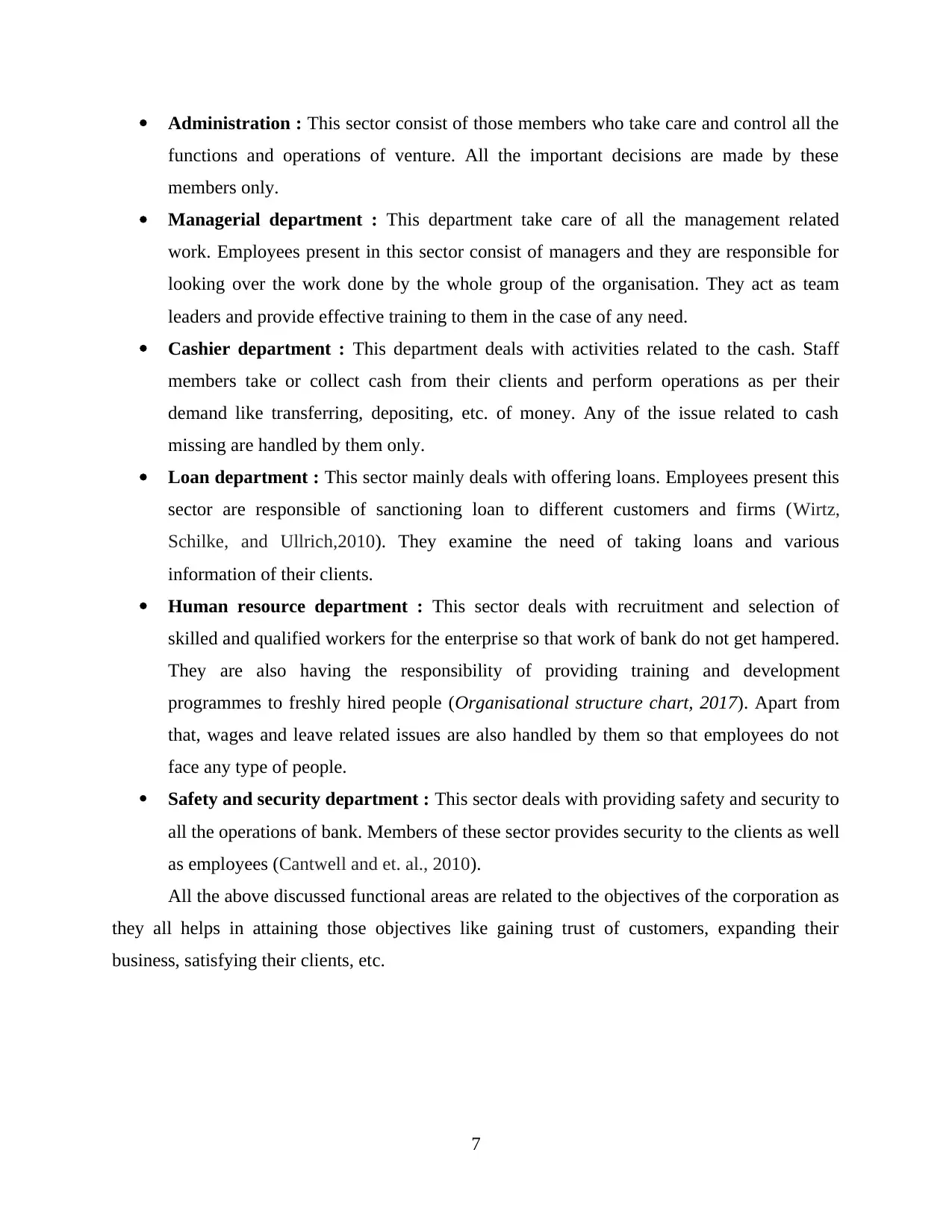
Administration : This sector consist of those members who take care and control all the
functions and operations of venture. All the important decisions are made by these
members only.
Managerial department : This department take care of all the management related
work. Employees present in this sector consist of managers and they are responsible for
looking over the work done by the whole group of the organisation. They act as team
leaders and provide effective training to them in the case of any need.
Cashier department : This department deals with activities related to the cash. Staff
members take or collect cash from their clients and perform operations as per their
demand like transferring, depositing, etc. of money. Any of the issue related to cash
missing are handled by them only.
Loan department : This sector mainly deals with offering loans. Employees present this
sector are responsible of sanctioning loan to different customers and firms (Wirtz,
Schilke, and Ullrich,2010). They examine the need of taking loans and various
information of their clients.
Human resource department : This sector deals with recruitment and selection of
skilled and qualified workers for the enterprise so that work of bank do not get hampered.
They are also having the responsibility of providing training and development
programmes to freshly hired people (Organisational structure chart, 2017). Apart from
that, wages and leave related issues are also handled by them so that employees do not
face any type of people.
Safety and security department : This sector deals with providing safety and security to
all the operations of bank. Members of these sector provides security to the clients as well
as employees (Cantwell and et. al., 2010).
All the above discussed functional areas are related to the objectives of the corporation as
they all helps in attaining those objectives like gaining trust of customers, expanding their
business, satisfying their clients, etc.
7
functions and operations of venture. All the important decisions are made by these
members only.
Managerial department : This department take care of all the management related
work. Employees present in this sector consist of managers and they are responsible for
looking over the work done by the whole group of the organisation. They act as team
leaders and provide effective training to them in the case of any need.
Cashier department : This department deals with activities related to the cash. Staff
members take or collect cash from their clients and perform operations as per their
demand like transferring, depositing, etc. of money. Any of the issue related to cash
missing are handled by them only.
Loan department : This sector mainly deals with offering loans. Employees present this
sector are responsible of sanctioning loan to different customers and firms (Wirtz,
Schilke, and Ullrich,2010). They examine the need of taking loans and various
information of their clients.
Human resource department : This sector deals with recruitment and selection of
skilled and qualified workers for the enterprise so that work of bank do not get hampered.
They are also having the responsibility of providing training and development
programmes to freshly hired people (Organisational structure chart, 2017). Apart from
that, wages and leave related issues are also handled by them so that employees do not
face any type of people.
Safety and security department : This sector deals with providing safety and security to
all the operations of bank. Members of these sector provides security to the clients as well
as employees (Cantwell and et. al., 2010).
All the above discussed functional areas are related to the objectives of the corporation as
they all helps in attaining those objectives like gaining trust of customers, expanding their
business, satisfying their clients, etc.
7
Paraphrase This Document
Need a fresh take? Get an instant paraphrase of this document with our AI Paraphraser
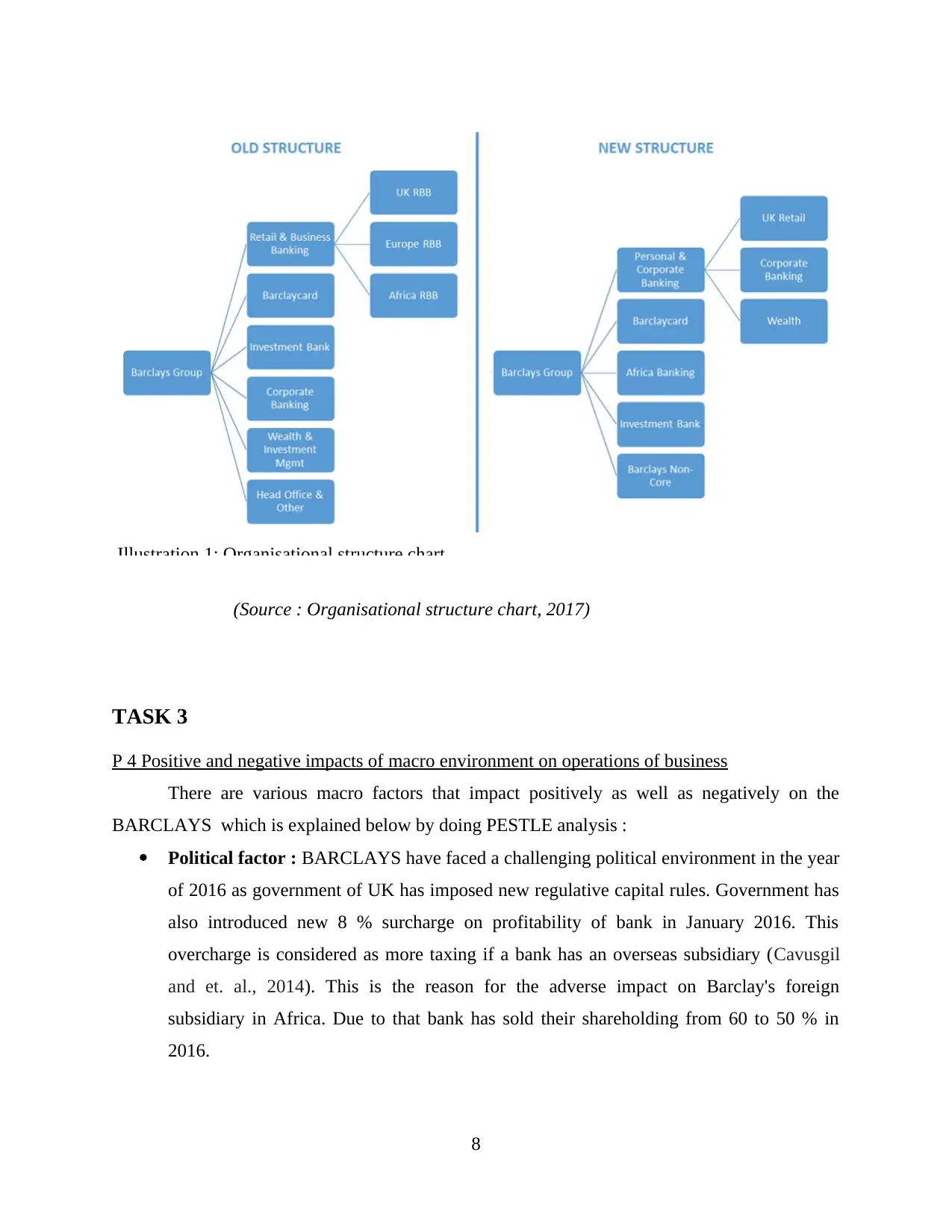
(Source : Organisational structure chart, 2017)
TASK 3
P 4 Positive and negative impacts of macro environment on operations of business
There are various macro factors that impact positively as well as negatively on the
BARCLAYS which is explained below by doing PESTLE analysis :
Political factor : BARCLAYS have faced a challenging political environment in the year
of 2016 as government of UK has imposed new regulative capital rules. Government has
also introduced new 8 % surcharge on profitability of bank in January 2016. This
overcharge is considered as more taxing if a bank has an overseas subsidiary (Cavusgil
and et. al., 2014). This is the reason for the adverse impact on Barclay's foreign
subsidiary in Africa. Due to that bank has sold their shareholding from 60 to 50 % in
2016.
8
Illustration 1: Organisational structure chart
TASK 3
P 4 Positive and negative impacts of macro environment on operations of business
There are various macro factors that impact positively as well as negatively on the
BARCLAYS which is explained below by doing PESTLE analysis :
Political factor : BARCLAYS have faced a challenging political environment in the year
of 2016 as government of UK has imposed new regulative capital rules. Government has
also introduced new 8 % surcharge on profitability of bank in January 2016. This
overcharge is considered as more taxing if a bank has an overseas subsidiary (Cavusgil
and et. al., 2014). This is the reason for the adverse impact on Barclay's foreign
subsidiary in Africa. Due to that bank has sold their shareholding from 60 to 50 % in
2016.
8
Illustration 1: Organisational structure chart
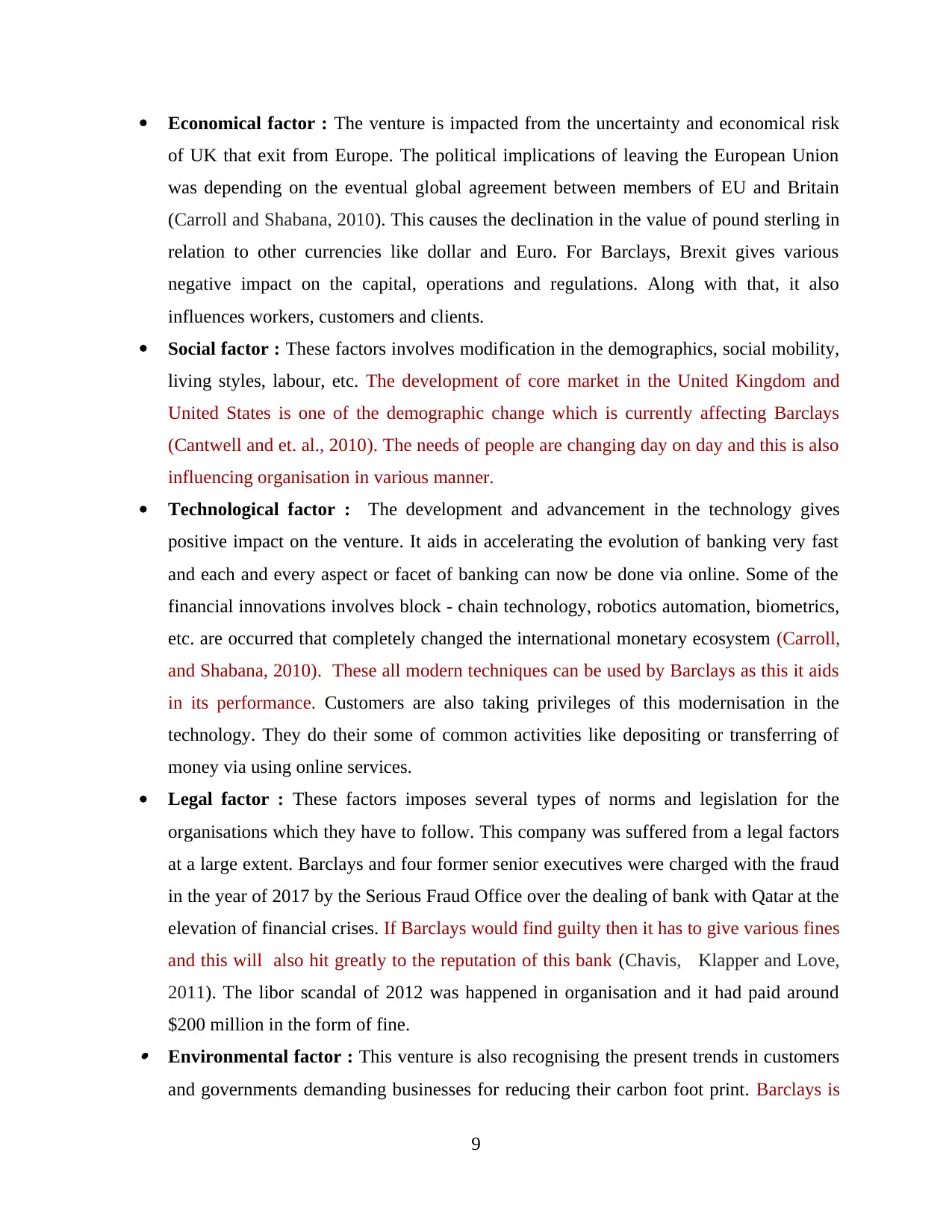
Economical factor : The venture is impacted from the uncertainty and economical risk
of UK that exit from Europe. The political implications of leaving the European Union
was depending on the eventual global agreement between members of EU and Britain
(Carroll and Shabana, 2010). This causes the declination in the value of pound sterling in
relation to other currencies like dollar and Euro. For Barclays, Brexit gives various
negative impact on the capital, operations and regulations. Along with that, it also
influences workers, customers and clients.
Social factor : These factors involves modification in the demographics, social mobility,
living styles, labour, etc. The development of core market in the United Kingdom and
United States is one of the demographic change which is currently affecting Barclays
(Cantwell and et. al., 2010). The needs of people are changing day on day and this is also
influencing organisation in various manner.
Technological factor : The development and advancement in the technology gives
positive impact on the venture. It aids in accelerating the evolution of banking very fast
and each and every aspect or facet of banking can now be done via online. Some of the
financial innovations involves block - chain technology, robotics automation, biometrics,
etc. are occurred that completely changed the international monetary ecosystem (Carroll,
and Shabana, 2010). These all modern techniques can be used by Barclays as this it aids
in its performance. Customers are also taking privileges of this modernisation in the
technology. They do their some of common activities like depositing or transferring of
money via using online services.
Legal factor : These factors imposes several types of norms and legislation for the
organisations which they have to follow. This company was suffered from a legal factors
at a large extent. Barclays and four former senior executives were charged with the fraud
in the year of 2017 by the Serious Fraud Office over the dealing of bank with Qatar at the
elevation of financial crises. If Barclays would find guilty then it has to give various fines
and this will also hit greatly to the reputation of this bank (Chavis, Klapper and Love,
2011). The libor scandal of 2012 was happened in organisation and it had paid around
$200 million in the form of fine. Environmental factor : This venture is also recognising the present trends in customers
and governments demanding businesses for reducing their carbon foot print. Barclays is
9
of UK that exit from Europe. The political implications of leaving the European Union
was depending on the eventual global agreement between members of EU and Britain
(Carroll and Shabana, 2010). This causes the declination in the value of pound sterling in
relation to other currencies like dollar and Euro. For Barclays, Brexit gives various
negative impact on the capital, operations and regulations. Along with that, it also
influences workers, customers and clients.
Social factor : These factors involves modification in the demographics, social mobility,
living styles, labour, etc. The development of core market in the United Kingdom and
United States is one of the demographic change which is currently affecting Barclays
(Cantwell and et. al., 2010). The needs of people are changing day on day and this is also
influencing organisation in various manner.
Technological factor : The development and advancement in the technology gives
positive impact on the venture. It aids in accelerating the evolution of banking very fast
and each and every aspect or facet of banking can now be done via online. Some of the
financial innovations involves block - chain technology, robotics automation, biometrics,
etc. are occurred that completely changed the international monetary ecosystem (Carroll,
and Shabana, 2010). These all modern techniques can be used by Barclays as this it aids
in its performance. Customers are also taking privileges of this modernisation in the
technology. They do their some of common activities like depositing or transferring of
money via using online services.
Legal factor : These factors imposes several types of norms and legislation for the
organisations which they have to follow. This company was suffered from a legal factors
at a large extent. Barclays and four former senior executives were charged with the fraud
in the year of 2017 by the Serious Fraud Office over the dealing of bank with Qatar at the
elevation of financial crises. If Barclays would find guilty then it has to give various fines
and this will also hit greatly to the reputation of this bank (Chavis, Klapper and Love,
2011). The libor scandal of 2012 was happened in organisation and it had paid around
$200 million in the form of fine. Environmental factor : This venture is also recognising the present trends in customers
and governments demanding businesses for reducing their carbon foot print. Barclays is
9
⊘ This is a preview!⊘
Do you want full access?
Subscribe today to unlock all pages.

Trusted by 1+ million students worldwide
1 out of 19
Related Documents
Your All-in-One AI-Powered Toolkit for Academic Success.
+13062052269
info@desklib.com
Available 24*7 on WhatsApp / Email
![[object Object]](/_next/static/media/star-bottom.7253800d.svg)
Unlock your academic potential
Copyright © 2020–2026 A2Z Services. All Rights Reserved. Developed and managed by ZUCOL.





